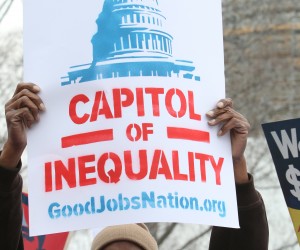
By Jana Kasperkevic
Members of Congress were greeted by low-wage workers protesting their pay in front of the Capitol as they returned to work on Wednesday. The faces were familiar: about two dozen of the striking workers serve breakfast, lunch and dinner to lawmakers at the Capitol. They also earn poverty wages that force them to rely on government assistance, such as food stamps, to make ends meet.
Good Jobs Nation, a group of “low-wage workers who serve America through federal contracts, concessions and leases with private businesses”, organized Thursday’s strike. This is the 10th strike of its kind, but the first time that Capitol workers have participated.
Paco Fabian, a spokesman for the campaign, described the Capitol as “tons and tons of money [on top] and workers in the basement barely scraping by, relying on public assistance to survive.”
Robyn Law, who works in the food service department at the Pentagon, is one of those workers. She is a single mother struggling to make ends meet as she also tries to support her own mother, who had a stroke a year ago.
“We’ve been going on strikes to protest poverty pay because single moms like me need their jobs to support our kids,” she said. Stumbling over her thanks to Barack Obama for the executive order that will raise her wages to $10.10 come January, she continued: “Truth be told, $10.10 isn’t enough to pay for the American dream. I spend my entire income paying rent, utility bills, metro fees and at the end of the day I am just broke.”
Three days before the strike, the campaign released a report calling on Obama to implement two additional Good Jobs executive orders.
“Workers are asking the president to do more. They are asking for a model employer executive order which would be: let’s do business with companies that are more like Costco and not so much like Walmart,” explained Fabian.
The second executive order would require federal contracts that allow employees to bargain collectively for better treatment and working conditions instead of having to resort to striking.
It’s not that the White House isn’t aware of these issues.
“President Obama has actually been doing something about wages, but has not been very vocal and articulate on the theme,” says Lawrence Mishel, president of the Economic Policy Institute. “This list is never really talked about as a package, so no one knows that Obama has a wage package. They don’t talk about it.”
“Why they don’t talk about it, I don’t know,” Mishel adds. “Maybe they are not really interested in raising wages and are just trying to appease some constituents, and trying not to poke businesses in the eye. The fact is, you have to take a stand. If you are going to raise wages, the businesses are going to get pissed off.”
Obama’s efforts on minimum wage have not carried the day, but they are worth revisiting.
Mishel: ‘[Obama] already has an executive order that extends higher minimum wage to federal contractors.’
Starting January, all new federal contracts will require that employers pay their workers $10.10. Federal contract workers, however, say that that isn’t enough.
The problem with the executive order is that it only applies to new contracts. Workers who currently have contracts are still being paid below $10.10.
Mishel: ‘He has proposed raising the minimum wage.’
During his 2013 State of the Union address, Obama called on Congress to raise the minimum wage to $9. It didn’t happen. In 2014, he upped the ante to $10.10 and supported bills proposed by Senator Tom Harkin and Representative George Miller.
The country has been moving towards wider support for a higher minimum wage, with four ballot initiatives passing in Alaska, Arkansas, Nebraska and South Dakota.
While these states will see their minimum wage become higher the federal minimum wage, which has been stuck at $7.25 since 2009, the new rates will still be below the White House-proposed $10.10. The smaller increases could be the key to widespread support, as modest increases are less likely to draw strong opposition.
Children of low-wage US federal contract workers attend a strike rally, asking for a $15 per hour minimum wage. Photograph: Gary Cameron/Reuters
Mishel: ‘Obama has directed the department of labor to expand eligibility for overtime pay.’
An issue that Mishel calls “low-hanging fruit” is the misclassification of employees. Companies often treat employees as if they were self-employed and as a result don’t have to provide them with proper protections and benefits. This Tuesday, the Department of Labor announced an agreement with New Hampshire to reduce misclassification of employees in that state.
Another problem: millions of US workers work more than 40 hours a week without seeing even a penny in overtime pay.
Why? Because the current ceiling that makes salaried employees eligible for overtime is set at $455 a week. The Economic Policy institute suggests that the threshold should be set no lower than $1,122 per week. Mishel estimates that the current numbers affect 6 million workers, who make between $25,000 and $50,000 a year.
“If your salary is even a dollar above the current threshold, you may not be guaranteed overtime. It doesn’t matter if what you do is mostly physical work like stocking shelves; it doesn’t matter if you’re working 50 or 60 or 70 hours a week – your employer doesn’t have to pay you a single extra dime,” President Obama said in March of this year, ordering the Department of Labor to figure out how to increase the pool of overtime eligible workers.
The Department of Labor spokesperson has previously told the Guardian that a proposed plan will be announced sometime this month.
